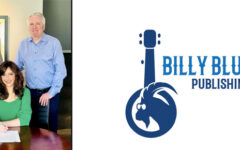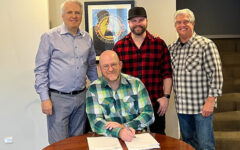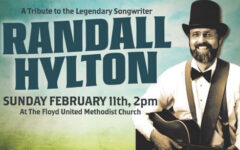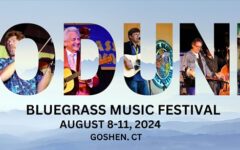This post is part of our occasional feature, Songwriter Profiles. If you have a suggestion for a bluegrass songwriter we might want to consider, please contact us.
 John Pennell started playing bluegrass in Arizona while he was in school at Arizona State University. He grew up surrounded by music. His father played upright bass – the instrument that John himself now plays – in square dance bands and his uncle played fiddle and guitar.
John Pennell started playing bluegrass in Arizona while he was in school at Arizona State University. He grew up surrounded by music. His father played upright bass – the instrument that John himself now plays – in square dance bands and his uncle played fiddle and guitar.
When he was about 12 years old he started playing trumpet and continued that through his high school years. He started playing guitar during his junior year in high school.
Pennell got more involved in bluegrass when he returned to Illinois for graduate school. Paul Zonn (Andrea’s father) invited him to play with them and they played a lot around the Champaign, Illinois area. Paul Zonn acquired a bass fiddle that Pennell played through the music school. While Pennell was a composition student at the University of Illinois he wrote songs for their little ensemble.
He met Alison Krauss during this period and the duo, along with Nelson Mandrell and John Gantz, started a band (Silver Rail). She was very good about wanting to do original material and Pennell was able to get a number of songs placed on her first Rounder album. This got him started as a songwriter.
He moved to Nashville in April 1996.
As a bluegrass performer Pennell has played with Chris Jones, Harley Allen and, currently, Charlie Sizemore, in addition to Alison Krauss.
When did you begin writing songs and why?
I started when I was about 20 (1970). I was doing solo gigs on guitar and wanted to include some songs that I had written. I’m a fan of the Beatles and I study their song writing all the time and it always inspires me. When I got into bluegrass, initially, I wrote songs that showed a lot of their influence as well as James Taylor, Gordon Lightfoot and Joni Mitchell. As I became more involved in bluegrass I started writing songs more specifically influenced by bluegrass or country. It’s an ongoing synthesis. The first songs I wrote were “acoustic” and more in the James Taylor, and Simon and Garfunkel thing, but they could be adapted to bluegrass.
Many of your songs have been recorded by Alison Krauss; who else has recorded your songs?
Alan Jackson (Meat and Potato Man, As Lovely As You), Eva Cassidy (If I Give My Heart), Jeff White, Chris Jones, The Infamous Stringdusters (Fork In The Road, I Wonder), Cadillac Sky (Blind Man Walking), Sam Bush (Riding That Bluegrass Train, The Wizard Of Oz, Bless His Heart), Gina Jeffries (Never Mine) Charlie Sizemore (Devil On A Plow).
Is there a particular art to writing songs for Alison Krauss?
Well, I think the songs have to come from some sort of genuine inspiration. And from that you get the elements she likes, i.e., good melodies, chord progressions and lyrical content. I try to take the approach I learned in music school, which was to search out a unique approach. The only difference is that I also wanted to make it accessible. The stuff I wrote for music composition classes was very inaccessible. Initially, I wrote songs with different chord progressions so that the melodies would always sound different and I tried to be a little adventurous in searching for the chord progressions I came up with. She can be very difficult to write for, but she has high standards, so when you get a song recorded by her you feel really good knowing she loved it. And her performance of it, well, enough said. Right?
Is there a song of yours which there is a background story?
Well, I suppose they all have a background story, to some extent, especially if it’s a broken heart song. But, a couple, Carry Me Across The Mountain, the basis of which was relayed to us by Hazel Dickens about a illness she had as a child and her mother’s determination to find a doctor in spite of her clans’ forbearance, and Jacob’s Dream (co-written with Julie Lee). The song itself pretty much tells the story except for the chorus, which we wrote trying to imagine what the boys would be thinking or doing to get out of their predicament. But, the song has its origin in a legend that comes from the area in Pennsylvania where Julie grew up. You can look it up online for a complete telling of the story; type in The Lost Children of The Alleghenies. The main thrust of the story is that two boys became separated from their parents early in the day in the spring of 1856. They were not found for two weeks after their disappearance and it was a dream that a man named Jacob Dibert had that led them to the place where they were discovered.
Several hundred men had searched in vain for the boys. Word was spread through church gatherings and newspapers about their disappearance, but, it was only after Jacob had his dreams that they were found. And, it was only Jacob and his wife’s brother who did the search, with many of the details of the dream reappearing as they looked for the boys. (a boy’s shoe, a dead deer and the tree under which they were found). A very chilling and sad story, but one of hope, I think, if you believe in a life after death. A very spiritual song, I believe.
Which of your songs give you the most satisfaction and why?
I dunno, different ones give me some satisfaction for different reasons. I guess as a songwriter, your always hoping to find the perfect blend of all the elements, i.e., melody, rhythm, harmony and lyrical continuity. And, you hope, a tight synthesis of all those elements. I like Every Time You Say Goodbye, Carry Me Across The Mountain and Jacob’s Dream for these reasons. But, I also like Dark Skies and Foolish Heart even though, technically, they are not perfect.
The most important thing to go for is to bring out the emotion of the idea you are writing about and that requires inspiration. Sometimes inspirational ideas overrule technique. I remember writing the chorus to Every Time You Say Goodbye. I played the song, as I had it written for Alison, over the phone. She loved it, but I said I didn’t like the bridge (some call it a chorus, but technically, it’s a bridge) and I’ll make it better. It just didn’t feel right. When I sat down the next day to work on it and it came in five minutes and I was very happy with it. It was the inside of the outside, if that makes sense. The verses were metaphors of rain and tears and arrows and coldness and the bridge was the internal emotional impact of those things, cause and effect, I guess.
Tell me about your own CD. Have songs from that CD been recorded by others?
I put this CD together towards the end of 1999. (guess I should think about doing another one) I had a bunch of really good demos that I had done myself with some great, great singers and musicians performing them, so, I thought, why not put out a CD of some of the ones you like the best, so, I did. It covers a wide range of styles that fall under the umbrella of country music; i.e. traditional country, somewhat progressive country, rockabilly, bluegrass, western swing, Nashville sound swing, country rock and so forth. My good friend and one of the best singer/songwriters I know, Harley Allen, sang a few of these for me. A couple were ones we wrote together, Devil On A Plow, and Half Mile Down The Road, and three that I wrote that he sang for me, very appreciative of that. Also, Mandy Barnette sang one, what an incredible voice, Kim Parent, one of my favorite singers ever, Jeff White, Jeff Allen (no relation to Harley) and Chris Jones; all are superb vocalists.
Several of these songs have been covered; Heartaches To Forget recorded by Chris Jones on Rebel Records, I Wonder by Jeff White on Rounder and The Infamous Stringdusters on Sugar Hill, Devil On A Plow by Charlie Sizemore on Rounder, Carry Me Across The Mountain by Dan Tyminski on Rounder, Half Mile Down The Road, by Troubled Waters, Lost And Found by Sally Jones on Pinecastle.
Your website indicates that Alecia Nugent, Sam Bush, and Gina Jeffries have recorded your songs, What are the respective titles?
Alecia recorded a song I co-wrote with Jerry Salley titled You’ve Still Got It, Gina recorded Never Mine (one of my favorite songs) co-written with Julie Lee and Sam has recorded three that he and I have co-written, Bless His Heart, Ridin’ That Bluegrass Train and The Wizard Of Oz.
The Wizard song is about St. Louis Cardinal shortstop Ozzie Smith. It was written to commemorate his induction into the Baseball Hall Of Fame in 2002. Bob Dylan played it on his XM Radio Hour and the resulting sound track was packaged and given to the Hall Of Fame. Pete Rose may not be in the Hall but Sam and I are. Sam and I really appreciate Bob selecting and playing our song. He’s a big baseball fan (obviously). The resulting album is a very eclectic collection of songs having to do with baseball; a couple blues, a jazz instrumental by Sonny Rollins for Brooklyn Dodger pitcher Don Newcombe, a lament by Ry Cooder , a real diverse and socially challenging collection as you might expect from Bob Dylan.
Who else has recorded your songs?
Well, I think I’ve mentioned about everyone, but here’s a list; Alison Krauss, Alan Jackson, Eva Cassidy, Gina Jeffries, Sam Bush, Charlie Sizemore, Alecia Nugent, Chris Jones The Infamous Stringdusters, Jeremy Garrett, Chris Jones, Sally Jones, Dan Tyminski, Katie Penn, Cadillac Sky.
What inspires you to write? Do you write from 9-5 (office hours)?
That’s a difficult question to answer. I write or like to write when an idea either comes to me or is presented to me (by a co-writer) that just takes over and won’t let go ‚Äòtil it’s done. Sometimes you have to wait for the inspiration to come, sometimes it just hits you. No set plan, just keep your antenna up and follow the muse. I write when I’m inspired, which could be any time day or night and I write by appointment with co-writers.
With whom have you written songs and what are the songs in question?
Too numerous to mention. But some of my favorite co-writers are Harley Allen:(Meat And Potato Man, Devil On A Plow), Sam Bush: (Wizard Of Oz, Ridin’ That Bluegrass Train), Julie Lee (Jacob’s Dream, Never Mine), Jeff White (Carry Me Across The Mountain, I Wonder, End Of The Line) and Chris Jones (Fork In The Road, Heartaches To Forget).







